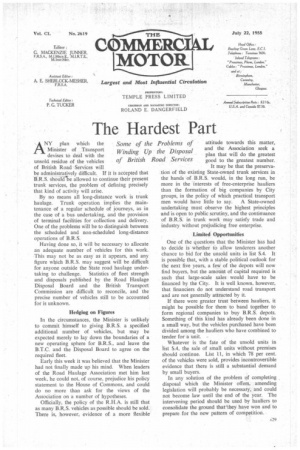The Hardest Part
Page 31

If you've noticed an error in this article please click here to report it so we can fix it.
KY plan which the Minister of Transport devises to deal with the unsold residue of the vehicles of British Road Services will be administratively difficult. If it is accepted that B.R.S. shoulne allowed to continue their present trunk services, the problem of defining precisely that kind of activity will arise.
By no means all long-distance work is trunk haulage. Trunk operation implies the Maintenance of a regular schedule of journeys, as in the case of a bus undertaking, and the provision of terminal facilities for collection and delivery. One of the problems will be to distinguish between the scheduled and non-scheduled long-distance operations of B.R.S.
Having done so, it will be necessary to allocate an adequate number of vehicles for this work. This may not be as easy as it appears, and any figure which B.R.S. may suggest will be difficult for anyone outside the State road haulage under taking to challenge. Statistics of fleet strength and disposals published by the Road Haulage Disposal Board and the British Transport Commission are difficult to reconcile, and the precise number of vehicles still to be accounted for is unknown.
Hedging on Figures In the circumstances, the Minister is unlikely to commit himself to giving B.R.S. a specified additional number of vehicles, but may be expected merely to lay down the boundaries of a new operating sphere for B.R.S., and leave the B.T.C. and the Disposal Board to agree on the required fleet.
Early this week it was believed that the Minister had not finally made up his mind. When leaders of the Road Haulage Association met him last week, he could not, of course. prejudice his policy statement to the House of Commons, and could do no more than ask for the views of the Association on a number of hypotheses.
Officially, the policy of the R.H.A. is still that as many B.R.S. vehicles as possible should be sold. There is, however, evidence of a more flexible attitude towards this matter, and the Association seek a plan that will do the greatest good to the greatest number.
It may be that the preservation of the existing State-owned trunk services in the hands of B.R.S. would, in the long run, be more in the interests of free-enterprise hauliers than the formation of big companies by City groups, in the policy of which practical transport men would have little to say. A State-owned undertaking must observe the highest principles and is open to public scrutiny, and the continuance of B.R.S. in trunk work may satisfy trade and industry without prejudicing free enterprise.
Limited Opportunities One of the questions that the Minister has had to decide is whether to allow tenderers another chance to bid for the unsold units in list 5.4. It is possible that, with a stable political outlook for the next five years, a few of the depots will now find buyers, but the amount of capital required is such that large-scale sales would have to be financed by the City. It is well known, however, that financiers do not understand road transport and are not generally attracted by it.
If there were greater trust between hauliers, it might be possible for them to band together to form regional companies to buy B.R.S. depots. Something of this kind has already been done in a small way, but the vehicles purchased have been divided among the hauliers who have combined to tender for a unit.
Whatever is the fate of the unsold units in list S.4, the sale of small units without premises should continue. List Ii, in which 78 per cent. of the vehicles were sold, provides incontrovertible evidence that there is still a substantial demand by small buyers.
In any solution of the problem of completing disposal which the Minister offers, amending legislation will probably be necessary, and could not become law until the end of the year. The intervening period should be used by hauliers to consolidate the ground that theyhave won and to prepare for the new pattern of competition.




































































































